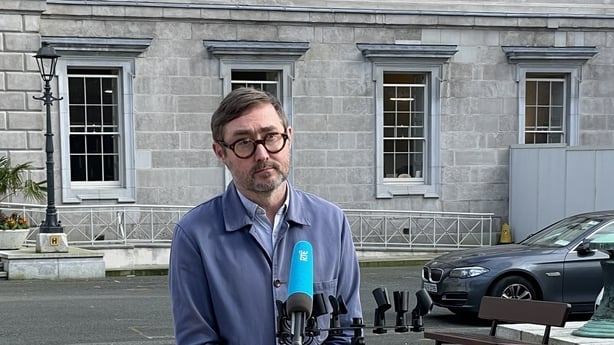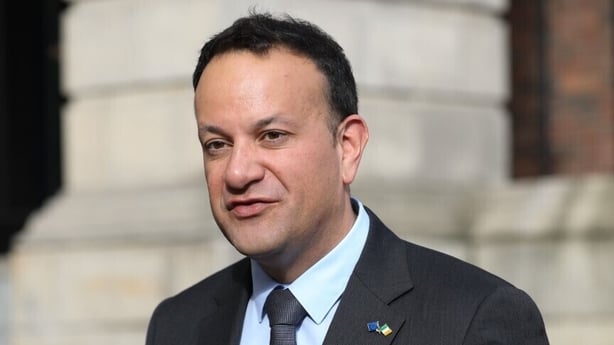In the unseasonably sun-kissed village of Baltimore in west Cork this weekend, two flags fly from the ramparts of the 13th century restored Norman castle, Dún na Séad. The tricolour in its usual spot fluttering above the square; and now, the blue and yellow of the Ukrainian national flag.
It must be something of a comfort for the Ukrainian family, a young mother and her three children, who fled last month's brutal Russian invasion of their country, and now are living in a house across the harbour, on nearby Sherkin Island.
When the children take the ferry to the mainland, and the schoolbus two kilometres to the local school, they see more Ukrainian flags along the way.
That spirit of generosity is being replicated in villages, towns and cities across Ireland.
Taoiseach Micheál Martin, and his ministers, have been lauding that national response at every turn this week.
They were also engaging in the complicated but necessary process of financial planning - while more than 16,000 refugees have arrived from Ukraine to date - tens of thousands more are expected to follow.
On his way into Cabinet on Tuesday, the Public Expenditure Minister, Michael McGrath, set out the Government's position: "The costs will be high, but they're costs that we have to meet. It's the right thing to do."
He informed his ministerial colleagues that his department projects that the bill to the Exchequer could be in the region of €2.5bn next year, should 100,000 Ukrainian refugees come here.
That eye-watering figure did come with big health warnings though - not surprising, given it was a scoping exercise.
Minister McGrath explained: "We simply don’t know how many refugees will come here, how long they will stay and how many will want to work in the Irish economy."
The Taoiseach said later that the required funds this year would come from the Covid Contingency Fund, with future financing being rolled into the annual budgetary cycle - starting this October.
When RTÉ's Morning Ireland first revealed the €2.5bn figure, it prompted an immediate response from Fianna Fáil’s Barry Andrews.
The Dublin MEP tweeted: "What about the benefit of hosting Ukrainian refugees, many of whom are highly skilled and eager to work?"
It was a sentiment I heard around Leinster House all week - people who are fleeing the invasion of Ukraine present opportunities for Ireland as well as logistical challenges - assisting them should not be reduced to a political football about the price-tag.
But hard questions are being asked of ministers and they need to reassure the public with considered and detailed answers.
Housing Minister Darragh O'Brien was put on the rack later during an interview on Today With Claire Byrne, as he outlined how an initial trawl by local authorities had identified 500 properties to help accommodate refugees.
The minister added that other long term options were being considered as it’s "more than likely that many of our Ukrainian friends that are here are going to stay for a sustained period of time."
When pressed, he said he estimates an additional 35,000 homes, over five or six years, may be required to solve the accommodation challenge presented by Ukrainian refugees.
The inevitable question followed - might people here not complain that the Government is moving quickly because of the refugee crisis, but they have failed to act on the country's housing crisis?
Mr O'Brien maintained his Housing For All plan was working to solve the housing crisis.
He added: "What we're going to have to do now - because of the most serious humanitarian crisis since World War II - is, of course, ramp that up. No question about that."
Opposition parties don't see it the same way.
Sinn Féin's housing spokesperson Eoin Ó Broin, said on Saturday with Katie Hannon, that the Children's Minister Roderic O'Gorman, and his staff, were doing "a very good job" in their efforts to "identify emergency accommodation outside of the mainstream housing system."
However, he warned that the Government needed to sit down "urgently" with Opposition parties to ensure that what he termed "resource competition" does not rear its ugly head.

Deputy Ó Broin contended that the Government's Housing For All policy was no longer "fit for purpose", and the aim now had to be to ensure that "no person or family can be left behind" - whether a refugee, a homeless person, or somebody on a housing waiting list.
The new Labour leader, Ivana Bacik, spoke on the same programme about how Ukrainians were keen to return home as soon as possible, while also keen to work while in Ireland and contribute to Irish society.
She said both Ministers O'Brien and O'Gorman needed to be "clearer about the plans for future provision."
This debate isn't limited to housing only.
The Independent TD Carol Nolan raised an issue in the Dáil about the "ongoing crisis in the allocation and provision of respite care services, particularly for children and adults with disability."
Deputy Nolan quoted from a statement by Minister O’Gorman on the war in Ukraine in which he said: "Ireland will not leave people with disabilities behind as we respond to the crisis".
She asked: "Every week in my offices I meet families who are struggling. They are begging for help. They are begging for respite for adult children. They are unable to cope and they have health conditions themselves. Will we assure these people there will be no erosion of current services, weak and all as they are, with the extra pressures coming into the system?"
It’s a difficult question for the Government to answer when it does not have hard data.

Tánaiste Leo Varadkar said on Friday that the latest figure for the number of Ukrainian refugees who had arrived in Ireland was greater than 16,000 - around half of whom have been able to source their own accommodation
He said the Government is planning for between 40,000 and 60,000 refugees to come here.
Then again, it could be much much higher than that.
Government planning must take into account all aspects of need - health, education, housing etc - as well as the impacts on existing, sometimes stretched, services.
What's needed is an integrated policy - framed in a way to ensure that the political discourse does not wind-up becoming a zero sum game: Irish vs Ukrainian - that would be a tragedy for all concerned and should be avoided.
That said, the Dáil statements on the war in Ukraine during the week did show a high degree of unity - with Sinn Féin, Labour, Social Democrats, People Before Profit and Independent TDs all restating the view that refugees must be welcomed in Ireland and given the help they need.
Public Expenditure Minister Michael McGrath promised that the Government would act "… as I know the vast majority of Irish people want us to do."
That widespread desire to help must be safeguarded. You can see it in evidence in Baltimore this weekend - not just in the numerous Ukrainian flags around the village, but in the generosity of spirit in which local people were offering a safe harbour to strangers fleeing war.







